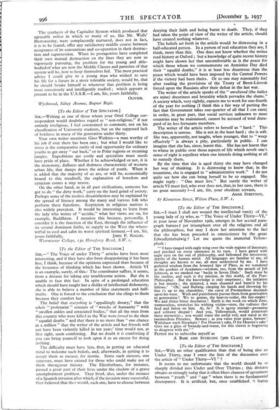[To the Editor of THE SPECTATOR.] SIR,—" The Voice of
under Thirty " articles have been most interesting, and if they have also been disappointing it has been less, I think, because of the opinions expressed than because of the looseness of thinking which has been shown. Article VI is an example, surely, of this' The contributor suffers, it seems, from a distaste for taking any troublesome action. But she is unable to face this fact. In spite of a prolonged education which should have taught her a dislike of intellectual dishonesty, she is able to believe a number of false statements and half- truths. One is forced to the conclusion that she clings to them because they comfort her.
The belief that everything is "appallingly dreary," that the whole " proletariat" consists of " wrecks of humanity " with " swollen ankles and emaciated bodies," that all the men from this country who were killed in the War were forced to die their " squalid deaths " and that there is no more than " one chance in a million " that the writer of the article and her friends will not have been violently killed in ten years' time would not, at first sight, seem comforting. But no doubt it is comforting if you can bring yourself to look upon it as an excuse for doing nothing.
The difficulty must have lain, first, in getting an educated mind to welcome such beliefs, and, afterwards, in getting it to accept them as excuses for inertia. Some such excuses, one supposes, must have existed for those who could make use of them throughout history. The Elizabethans, for instance, passed a great part of their lives under the shadow of a grave unemployment problem. They lived, also, under the menace of a Spanish invasion after which, if the invasion were surt-pcsful, they believed that they would, each one, have to choose between denying their faith and being burnt to death. They, if they had taken the point of view of the writer of the article, should have created nothing whatever.
The beliefs set forth in the article would be distressing in a half-educated person. In a person of real education they are, I think, more than this. One does not know whether the writer read hisiory at Oxford ; but a knowledge of quite recent history might have shown her that uncomfortable as is ,the peace for which those whom we commemorate on Armistice Day died their " squalid deaths," it is at least less disastrous than the peace which would have been imposed by the Central Powers if the victory had been theirs. Or so one may reasonably feel after reading the provisions of the . Treaty of Brest-Litovsk forced upon the Russians after their defeat in the last war.
The writer of the article speaks of the " unrelieved (the italics are mine) dreariness and brutality which pervades the slums." A society which, very rightly, expects me to work for one-fourth of the year for nothing (I think this a fair way of putting the fact that Government takes one-quarter of all that I can earn) in order, in great part, that social services unknown to most countries may be maintained, cannot be accused of total disre- gard of its less fortunate members.
The writer of the article refers to herself as "hard.'.' This description is'untrue. She is not in the least hard ; she is soft. She was, apparently, not taught, when younger, that to " weep effusively " is always a pity, particularly in public. I can imagine that she has, since, learnt this. She has not learnt that to whine in public over those aspects of life which revolt one's sense of right is repellent when one intends doing nothing at all to remedy them.
By the time that she is aged thirty she may have changed her way of thinking. It is distressing to know that, in the meantime, she is engaged in " administrative work." I do not quite see how she can bring herself to be so engaged. She might reply : " One must live." But surely the writer of article VI must feel, who ever does not, that, in her case, there is no great necessity ?—I am, Sir, your obedient servant, 87 Kinnerton Street, Wilton Place, S.W. r.


























































 Previous page
Previous page